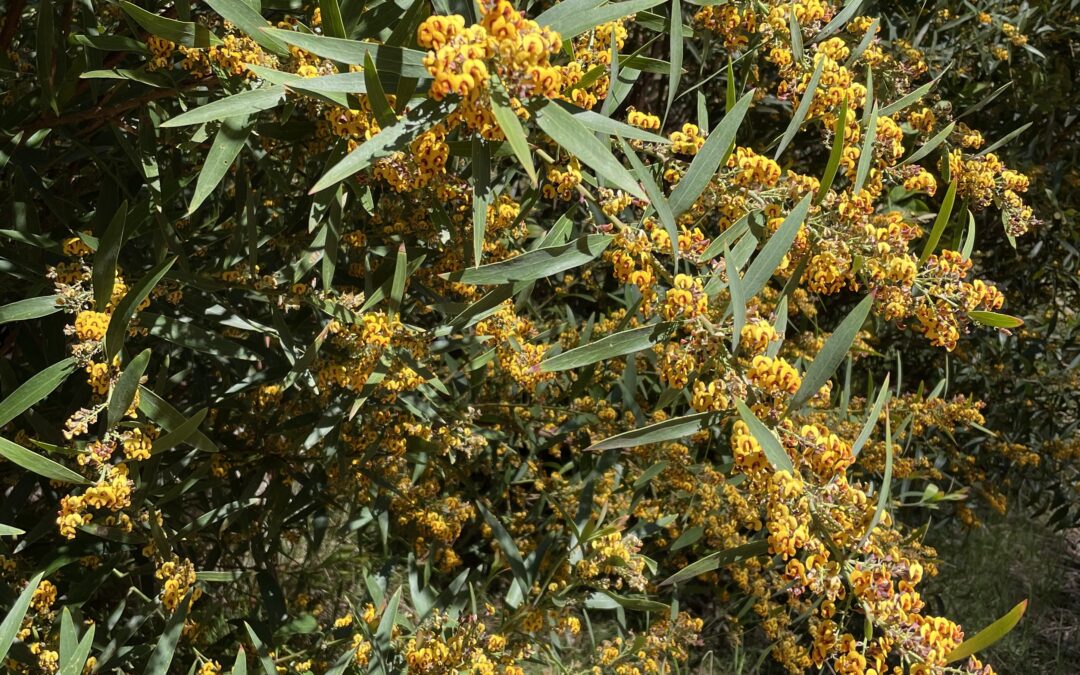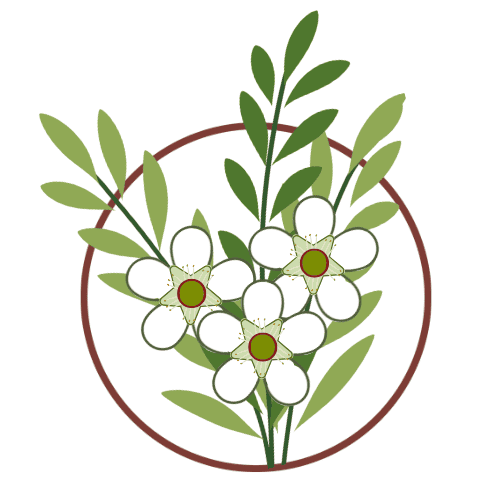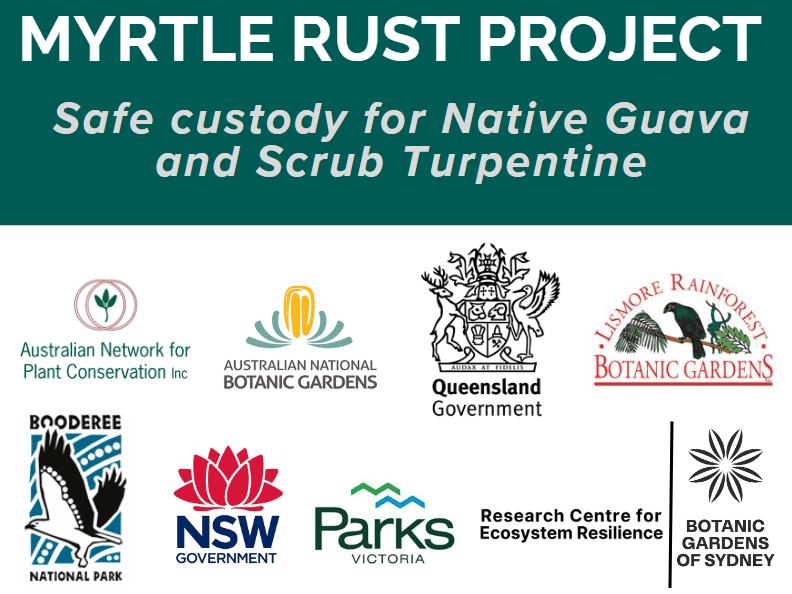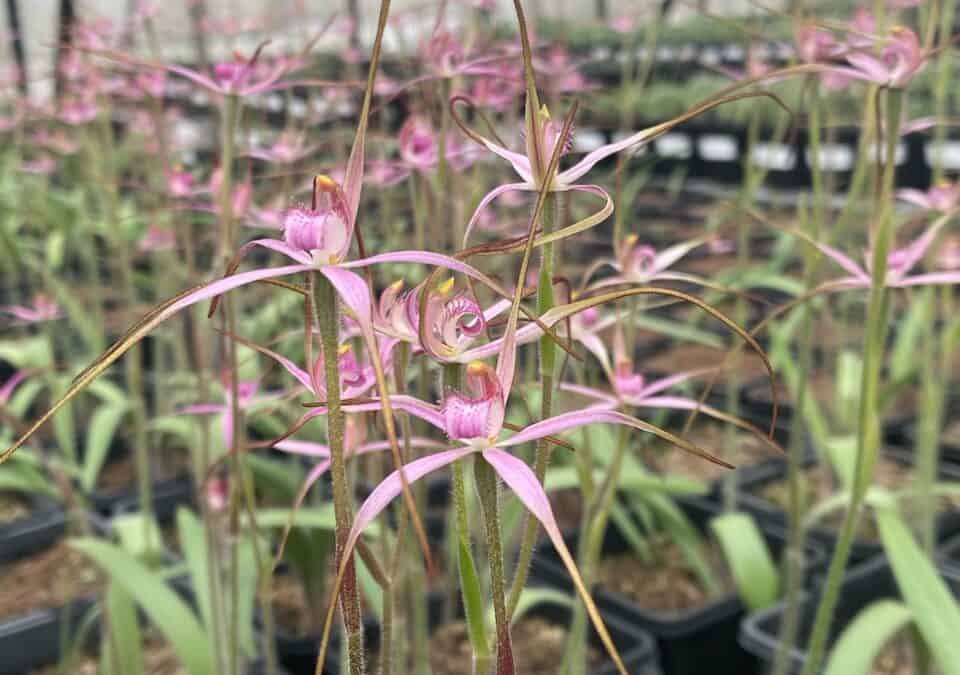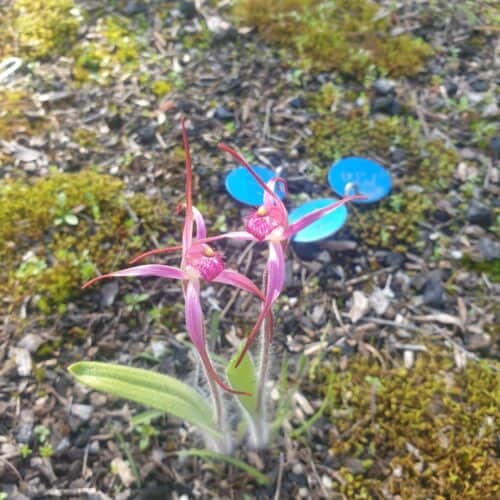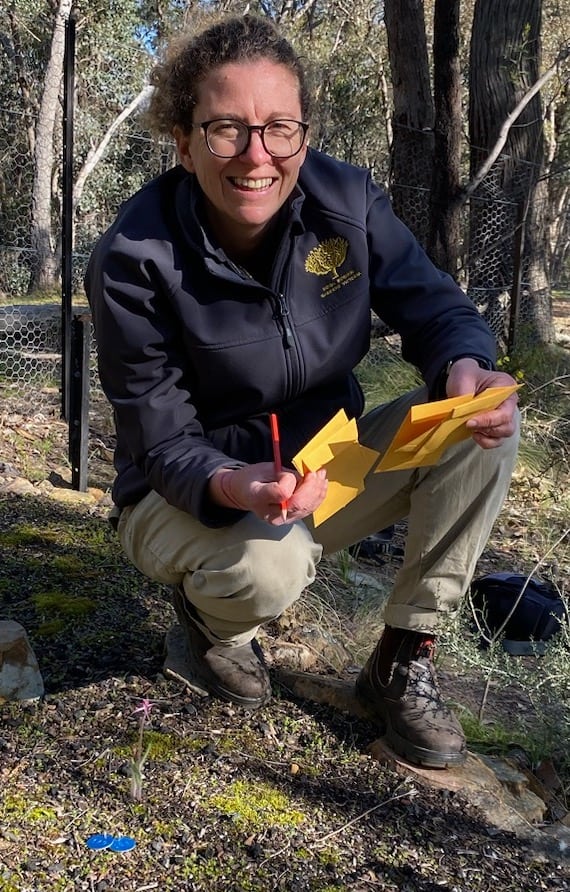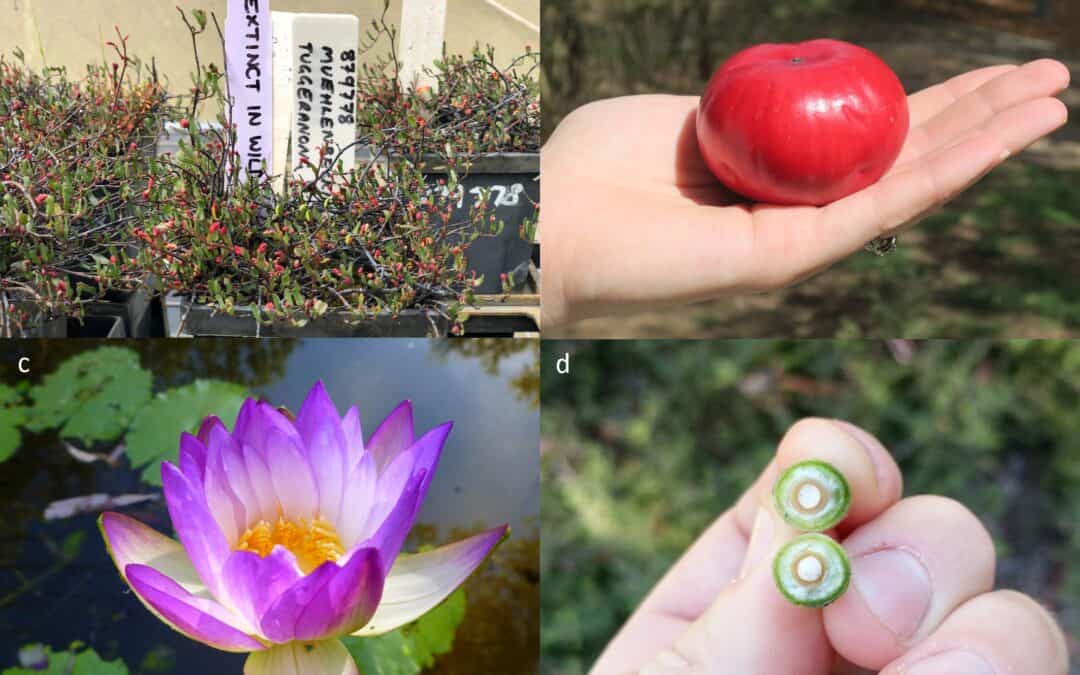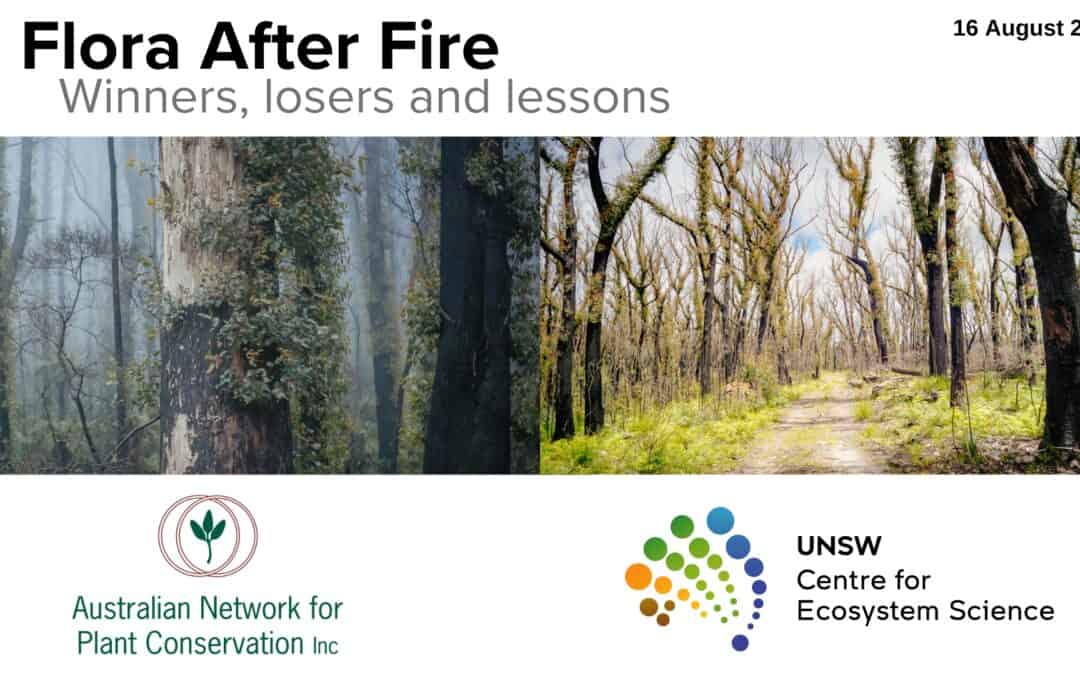
Nov 20, 2023 | News
While commonly known as the Grampians Bitter-Pea, Daviesia laevis is not only found in the Grampians/Gariwerd, with small populations also known from nearby ranges Mt Langi Ghiran, Mt Cole/Buangor and the Black Range. This large shrub has quite large, leaf-like phyllodes that are very similar to those found in many Wattle species, and for much of the year this could easily be mistaken for a Wattle. However, when in flower when it displays its small egg-and-bacon type flowers on mass with great effect.
Daviesia laevis is nationally listed as Vulnerable (EPBC) and within Victoria as Critically Endangered (FFG) due to its low population size and limited distribution. Small population size together with the need for disturbance such as fire for recruitment make this species vulnerable to inappropriate disturbance regimes and other threats such as weed invasion and macropod browsing. There is a clear need for ex-situ conservation of this species to ensure its ongoing survival, which is why it has been chosen as one of the 24 species in the Preventing the extinction of Victoria’s threatened flora project run by the Royal Botanic Gardens Victoria. For this species our efforts will focus on collecting seed for long term storage and plant material for ex-situ living collections along with isolation, collection and storage of the symbiotic rhizobia needed for this species to grow.
This research is funded by DEECA Victoria’s Nature Fund. The ‘Preventing the extinction of Victoria’s threatened flora’ project is led by Royal Botanic Gardens Victoria in partnership with La Trobe University, Australian Network for Plant Conservation, DEECA, Trust for Nature, ENVITE, Bairnsdale & District Field Naturalists Club, Friends of the Grampians Gariwerd, Wimmera CMA, Nillumbik Shire, Halls Gap Botanic Gardens and the Australasian Native Orchid Society Victorian Branch.
Feature image: Daviesia laevis (supplied RBGV)

Nov 16, 2023 | News
The ANPC’s Annual General Meeting was held on 15 November 2023. A big thank you to all the members who attended in person or via Zoom.
We heard a summary of the President’s Report from outgoing President Tony Auld on all of the significant projects which have been undertaken this year. Tony also highlighted the important work carried out by our project managers Amelia Martyn Yenson, Chantelle Doyle and Jason Halford over the past year, along with Outreach Delegate Bob Makinson, as well as office staff Jo Lynch, Richie Southerton and volunteer Robert Hawes. He also took the opportunity to thank the members of the committee who are finishing their terms. The full President’s Report 2023 will be made available soon, watch this space.
New Treasurer Daniel McKinnon then provided a financial update, reporting a small deficit in the financial year up to June 2023, but projecting a surplus in the coming years. He reported that the organisation is in a healthy financial position.
We also heard an update on membership by Business Manager Jo Lynch, who reported slightly lower membership numbers for 2023, which was not unexpected given that it was not an ANPC conference year. Jo also welcomed our two new corporate members, Alcoa and Tondoon Botanic Gardens, Gladstone Regional Council. Membership renewals will go out soon so keep an eye out for those.
Outgoing Australasian Plant Conservation Editor Nathan Emery also provided some highlights of APC’s reporting over the past year, including a new type of article called “Photos from” where authors could submit a short article to go with a photo they had taken from the field or lab.
Committee Member Elections
We are delighted to welcome our new Vice President Melissa Millar, as well as Ignacio Czajkowski, Bradley Desmond, John Hodgon, and Heidi Zimmer as new members of our Management Committee, while Kelly Gowland will continue as a committee member.
Additionally we’d like to thank outgoing President Tony Auld and Vice President David Coates, who will both remain on the committee as ordinary members. David has also kindly agreed to act as President in the interim until a new President is appointed.
We would also like to extend a big thank you to Andrew Crawford, Singarayer Florentine, Lydia Guja, Cathy Offord and Damian Wrigley who are leaving the committee this year, as well as our former Treasurer Grant Warner, departing APC Editor Nathan Emery, departing Project Manager Jason Halford, former Project Manager Amelia Martyn Yenson and former Communications Manager Christine Fernance for all their excellent work in what has been a very busy 2023.
Lastly, thanks to all the members and corporate sponsors for their contribution to another successful year of plant conservation work.

Nov 3, 2023 | News
The extended Myrtle Rust Project funded by NSW Department of Planning and Environment is progressing well. Coordinated by ANPC Project Manager Chantelle Doyle since June 2023, the project has so far achieved the following:
- Dispersal of 10 additional Native Guava (Rhodomyrtus psidioides) plants and lineages to 3 partner gardens to supplement the existing ex situ
- Dispersal of 13 Scrub Turpentine (Rhodamnia rubescens) plants and lineages to 3 partner gardens.
- New partner Booderee Botanic Gardens has joined the project group.
- Five collaborative partner meetings have been held, with much discussion on managing the collections, along with informative presentations from key researchers at Botanic Gardens of Sydney: Dr Manueal Cascini outlining the status of genetic analysis Rhodamnia maideniana and Dr Jason Bragg on Myrtle Rust resistance in Rhodamnia rubescens.
- Continued collation of dispersal data.
- Epicollect monitoring of the ex situ collections is ongoing and has been streamlined for ease of use. All gardens can now access the raw data and export for their personal records (training undertaken by DPE’s Craig Stehn)
- Additional collection of germplasm and genetic material from healthy psidioides appearing in response to drying climate.
- Additional collection of genetic material from healthy maideniana and R. whiteana plants observed in the field being sent to Dr Manuela Cascini for additional genetic analysis.
- Collection of Rhodamnia and Rhodomyrtus fruit being sent to Dr Karen Sommerville for storage and viability testing.
- Planning future co-facilitated ANPC/BCARM practitioner meetings for managing Myrtle Rust impacted collections.
- An outreach flyer has been developed outlining the project background and aims, for the general public when visiting the ex situ collections and which can be used for guided walks.
- Botanic Gardens of Sydney blog on how ‘genetics is helping to save plant species decimated by myrtle rust’ dated 28 July 2023.
See more here:
https://www.anpc.asn.au/news/myrtle-rust-project-extension/

Oct 13, 2023 | News
This rose-pink spider orchid is critically endangered and restricted to only a few sites in the north-east suburbs of Melbourne. Royal Botanic Gardens Victoria (RBGV) scientists have been busy surveying remnant and translocated populations and collecting genetic samples as part of the ‘Preventing the extinction of Victoria’s threatened flora program’. The genetic analysis will help guide strategic cross-pollination to produce more genetically diverse seed both for long term storage and to supply new plants for further reintroductions into the wild.

Supplied: Royal Botanic Gardens Victoria
Pollination surveys are also underway, with scientists using nursery grown plants to attract the pollinator, a native bee in the genus Leioproctus. Identifying the presence of the key pollinator in potential translocation sites is a crucial step in site selection suitability, as Caladenia rosella plants will not set seed and regenerate at a site if it is absent.

Supplied: Royal Botanic Gardens Victoria
The ‘Preventing the extinction of Victoria’s threatened flora’ project is led by Royal Botanic Gardens Victoria in partnership with La Trobe University, Australian Network for Plant Conservation, DEECA, Trust for Nature, ENVITE, Bairnsdale & District Field Naturalists Club, Friends of the Grampians Gariwerd, Wimmera CMA, Nillumbik Shire, Halls Gap Botanic Gardens and the Australasian Native Orchid Society Victorian Branch.
This project is funded by the Victorian Government Department of Energy, Environment and Climate Action Nature Fund.

Sep 15, 2023 | News
 Conservation seedbanks maintain collections of many seed-bearing plant species, providing propagation material and data to support management of wild populations. But some plant species produce seeds that are difficult to collect, dry, store and utilise; collectively recognised as ‘exceptional’ species.
Conservation seedbanks maintain collections of many seed-bearing plant species, providing propagation material and data to support management of wild populations. But some plant species produce seeds that are difficult to collect, dry, store and utilise; collectively recognised as ‘exceptional’ species.
In this paper recently published by ANPC, Australian Seed Bank Partnership, and their collaborators in the journal Plants, People, Planet, we test a framework for identifying exceptional species within the Australian flora.
Our expert working group document examples and case studies for each ‘Exceptionality Factor’. We also want to make it easier for conservation practitioners to recognise exceptional species and work around the challenges they present, so the paper includes a workflow that may be used to identify additional exceptional species, and direct efforts to establish appropriate collection types.
Read the paper here: Ex situ germplasm collections of exceptional species are a vital part of the conservation of Australia’s national plant treasures
This work was co-authored by researchers from The Botanic Gardens of Sydney, Australian National Botanic Gardens, Kings Park and Botanic Garden, the Western Australia Seed Centre, WA Parks and Wildlife Service, CSIRO, The University of WA, Alcoa Australia, and the Australian Academy of Science.

Sep 7, 2023 | News
Recordings are now available for the ‘FLORA AFTER FIRE – winners, losers and lessons‘ online symposium held on Wednesday 16 August in collaboration with the Centre for Ecosystem Science, UNSW. Watch the presentations on Youtube HERE
The presentations cover the following three themes, with a special emphasis on Black Summer impacts and recovery
– plant and fire relationships
– impacts and observations (case studies)
– lessons and actions moving forward
